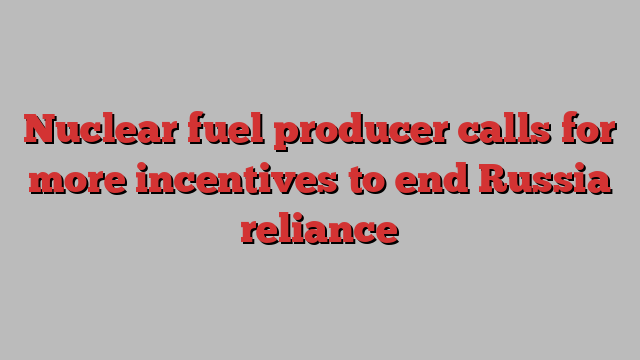
Unlock the Editor’s Digest for free
Roula Khalaf, Editor of the FT, selects her favourite stories in this weekly newsletter.
The west will struggle to break its reliance on Russian nuclear fuel without bigger incentives for alternative suppliers or restrictions on Moscow’s supplies, the head of the second-largest western supplier of enriched uranium has warned.
“To entirely disconnect from Russia, we need new capacities, and industrial groups will only invest if they have long-term contracts,” Nicolas Maes, chief executive of French group Orano, told the Financial Times. “It’s then up to the political world to choose what they do to make that happen.”
After President Vladimir Putin’s full-blown invasion of Ukraine in 2022, the nuclear fuel supply chain was initially spared sweeping sanctions like those imposed on Russian oil and gas because of Moscow’s dominant position, with roughly 40 per cent of the global enrichment market.
The US this year moved to ban Russian nuclear fuel imports, with potential waivers until 2028. But in Europe a historical reliance on Russian supplies for more than 30 Russian-made power stations across the east of the continent, including Ukraine, has made it more complicated to find a consensus for sanctions, although some western companies are now making fuel assemblies that can be used in the Russian designs.
Maes said new uranium enrichment plants could take only a few years to build. Orano, one of the few western rivals to Russian nuclear fuel supplier Rosatom alongside British-Dutch-German consortium Urenco, is extending a facility in France in a €1.7bn project that should start producing by 2028.
But he added that while it was technically possible to replace Russian supplies by next decade, it would require huge investment that providers would only consider if demand was guaranteed.
“What’s certain is that if you have a maximum level of sanctions, new investments in [enrichment] capacities are going to be developed at maximal level,” Maes said.
“If there are no sanctions at all, we’ll see some electricity producers continue to get supplies from Russia as long as it’s possible.”
He said Orano had pre-signed contracts with US and European customers to buy the output from its French enrichment plant extension, and that there were other nuclear power nations that had been keen to diversify their supplies since the start of the war, from South Korea and Japan to South Africa and India.
Sanctions may not be a catch-all solution to incentivise customers to sign new western contracts, however. The US is investigating whether Russia is circumventing its ban thanks to help from China.
“A scheme under which people are told they’re not allowed to buy in Russia, so Russia sells to China, which sells its enriched uranium to the western world — that wouldn’t fix the problem,” Maes said.
Backed by the French state, and born out of a group once known as Areva, Orano has been diversifying its activities in recent years, including a sideline in the medical sphere with radiopharmaceuticals.
However, it fell to a €133mn loss in the first half of 2024 because of problems in its core mining division, particularly in Niger, where its uranium production was disrupted by a coup last year.
Orano’s exports from the country have now dried up completely, for which it has been able to compensate with extra production from its mines in Canada. But it was still trying to salvage the Niger operations as Orano “is not exonerated from its social and local implication” there, Maes said.
The company is launching a legal challenge to the ruling junta’s decision this summer to withdraw its permit to exploit its Imouraren site, which is under development, Maes added. It is also trying to lift export restrictions that have forced it to stop operations at its one operational mine in the country.
“It’s having liquidity issues and there’s no cash coming in,” Maes said, adding that the situation could tip the mine into insolvency.